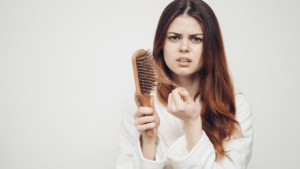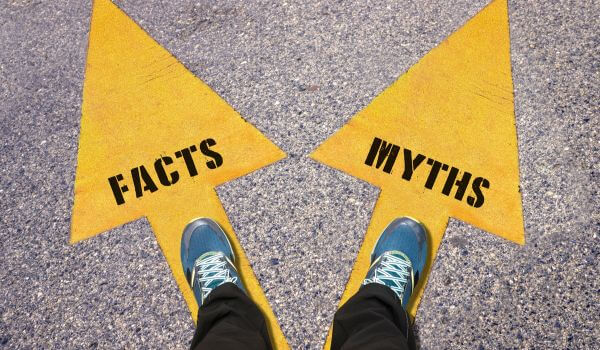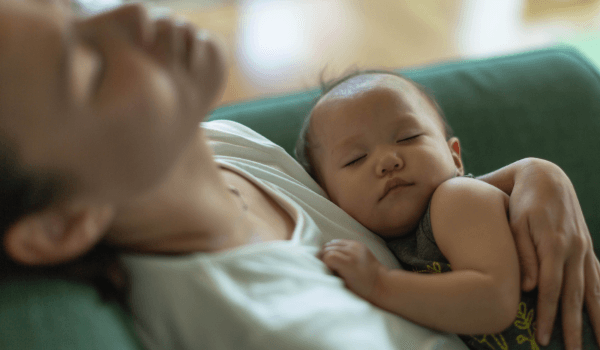The world of beauty and wellness has been waiting for an elixir that could revolutionize hair loss for women. Hair loss isn’t just an external feature that other people see. Mounting evidence points to early or unexpected hair loss as having a significant psychological and social impact on people living from this unfortunate condition. Hair loss has been directly linked to poorer mental health and lower levels of self-confidence, self-worth, and self-esteem.
 Hair loss in women can happen for many reasons, including changes in the body’s hormones that come with age, and everyday stress. Other significant milestones like pregnancy and postnatal changes present their unique features that can also affect how the hair looks and grows, fades, and falls.
Despite the cause of hair loss, there is hope on the horizon. There is a new and natural food supplement that can gently reverse the process of hair damage and loss no matter what the cause. Phyllotex is a new and innovative solution designed to reverse hair loss loss and promote regrowth. Phyllotex contains a combination of natural ingredients and vitamins and minerals such as vitamin D, vitamin B5 (pantothenic acid), zinc, and magnesium. Together, these protect and stimulate hair follicles and reverse hair loss naturally.
Phyllotex can reduce excess hair shedding and promote faster growth of thicker and longer hair. It is entirely natural, vegetarian, without side effects, and intended for both women and men. After research and clinical trials, the Phyllotex nutritional supplement has been patented and is available for purchase right here on IsraelPharm.
Hair loss in women can happen for many reasons, including changes in the body’s hormones that come with age, and everyday stress. Other significant milestones like pregnancy and postnatal changes present their unique features that can also affect how the hair looks and grows, fades, and falls.
Despite the cause of hair loss, there is hope on the horizon. There is a new and natural food supplement that can gently reverse the process of hair damage and loss no matter what the cause. Phyllotex is a new and innovative solution designed to reverse hair loss loss and promote regrowth. Phyllotex contains a combination of natural ingredients and vitamins and minerals such as vitamin D, vitamin B5 (pantothenic acid), zinc, and magnesium. Together, these protect and stimulate hair follicles and reverse hair loss naturally.
Phyllotex can reduce excess hair shedding and promote faster growth of thicker and longer hair. It is entirely natural, vegetarian, without side effects, and intended for both women and men. After research and clinical trials, the Phyllotex nutritional supplement has been patented and is available for purchase right here on IsraelPharm.
 Hair loss in women can happen for many reasons, including changes in the body’s hormones that come with age, and everyday stress. Other significant milestones like pregnancy and postnatal changes present their unique features that can also affect how the hair looks and grows, fades, and falls.
Despite the cause of hair loss, there is hope on the horizon. There is a new and natural food supplement that can gently reverse the process of hair damage and loss no matter what the cause. Phyllotex is a new and innovative solution designed to reverse hair loss loss and promote regrowth. Phyllotex contains a combination of natural ingredients and vitamins and minerals such as vitamin D, vitamin B5 (pantothenic acid), zinc, and magnesium. Together, these protect and stimulate hair follicles and reverse hair loss naturally.
Phyllotex can reduce excess hair shedding and promote faster growth of thicker and longer hair. It is entirely natural, vegetarian, without side effects, and intended for both women and men. After research and clinical trials, the Phyllotex nutritional supplement has been patented and is available for purchase right here on IsraelPharm.
Hair loss in women can happen for many reasons, including changes in the body’s hormones that come with age, and everyday stress. Other significant milestones like pregnancy and postnatal changes present their unique features that can also affect how the hair looks and grows, fades, and falls.
Despite the cause of hair loss, there is hope on the horizon. There is a new and natural food supplement that can gently reverse the process of hair damage and loss no matter what the cause. Phyllotex is a new and innovative solution designed to reverse hair loss loss and promote regrowth. Phyllotex contains a combination of natural ingredients and vitamins and minerals such as vitamin D, vitamin B5 (pantothenic acid), zinc, and magnesium. Together, these protect and stimulate hair follicles and reverse hair loss naturally.
Phyllotex can reduce excess hair shedding and promote faster growth of thicker and longer hair. It is entirely natural, vegetarian, without side effects, and intended for both women and men. After research and clinical trials, the Phyllotex nutritional supplement has been patented and is available for purchase right here on IsraelPharm.
Stress
As much as we may wish that we could avoid stress altogether, it is part of the fabric of a full life in some form or another. While zero stress is not a realistic goal for most, it is important to realize the toll that stress can take and to understand, that extended stress cause hair loss or make it harder for hair to grow. A study by Harvard University researchers showed that chronic stress can impair hair follicle stem cells, which play a crucial role in hair regeneration. They found that a hormone produced by the adrenal glands during periods of stress (cortisol) can inhibit hair regrowth by acting on a cluster of cells underneath the hair follicle called the dermal papilla. This leads to the hair follicles remaining in an extended resting phase. Other explanations include:- Oxidative stress: In simple terms, oxidative stress is when the body has too many harmful substances (called free radicals) and insufficient antioxidants to keep them in check. This can cause problems for hair and overall health. Things like too much sun exposure, using harsh chemicals on the hair, air pollution, drinking alcohol, smoking, and not eating a healthy diet can all contribute to this kind of stress. By avoiding these as much as possible and eating foods rich in vitamins like A, E, and C, as well as minerals like zinc, you can help the body maintain a better balance and protect the hair.
- Physical stress from non-gentle hair treatment: the hair can also suffer if you’re not treating it gently. For example, suppose you always pull the hair back tightly. In that case, it can lead to a condition called traction alopecia, where the constant pulling damages the hair follicles and causes hair loss. Also, frequently using hot styling tools or brushing hair too aggressively can lead to damage and hair loss. So, remember to treat the hair kindly – if you must use heat, try to use a heat protectant spray and avoid pulling or brushing hair too hard.
- Emotional stress: Big emotional upsets can cause hair loss too. You might notice that there’s more hair loss than usual after a stressful event like a significant life change or loss. Stress can push the hair follicles into a resting phase, resulting in hair falling out more than usual, without replacement hairs growing immediately. In some cases, stress can even cause the immune system to attack the hair follicles, causing patches of hair loss.
Prenatal changes
Prenatal hormonal changes can also promote the loss of quality and quantity. Before and during pregnancy, hormonal changes can disrupt the typical hair growth cycle, leading to hair loss. For example, for women who have been on a birth control regimen, the hormonal changes when they stop taking birth control pills can cause hair changes or even loss. Similarly, pregnancy can trigger or exacerbate various health conditions like high blood pressure, thyroid imbalances, gestational diabetes, and vitamin deficiencies that may contribute to hair loss. A severe form of morning sickness known as hyperemesis gravidarum can also cause nutrient depletion, leading to hair loss. Pregnancy can also cause a delayed form of hair loss known as telogen effluvium. During pregnancy, hormonal changes disrupt the normal hair cycle, causing the scalp to retain hair that would typically be shed. After childbirth, when hormone levels return to normal, the hair resumes its usual cycle, leading to the shedding of the extra hair retained during pregnancy. This hair thinning might peak three to four months after delivery before hair follicles become active again. In most cases, hair loss due to pregnancy usually grows back. While pregnancy-related hair loss might be alarming to expectant or new mothers, the hair typically grows back to its previous fullness within 12 months. Any changes caused by hormonal imbalances should resolve once hormone levels return to their pre-pregnancy state. However, in some cases, if a woman is predisposed to conditions like female pattern baldness, pregnancy can accelerate these conditions, and the hair may not fully grow back within the expected 12-month window. Several strategies can be employed to help reduce hair loss due to pregnancy and promote normal hair regrowth. Avoid harming the hair with heat, fine-tooth combs, or harsh cleansers during and immediately after pregnancy. Also, avoid hairstyles that strain the hair follicles, such as cornrows or hair weaves.Postnatal changes
Being a new mom is a whirlwind, and feeling stressed out is normal. However, stress can make the hair take a break from growing and even fall out, a condition known as telogen effluvium. So, caring for yourself is essential, even while caring for the newborn. Any bit of stress relief can help the hair get back to growing. Try to grab moments of rest when you can. Also, keep an eye out if you are pulling at the hair when stressed, a habit linked to a condition called Trichotillomania.- Post-breastfeeding hair changes: When breastfeeding, the body is flooded with hormones that might change how the hair behaves. As a woman stops breastfeeding, these hormonal changes can cause hair to fall out. To manage this, consider taking hair-healthy supplements before you stop breastfeeding, which may help keep the hair in good shape.
- The estrogen rollercoaster: During pregnancy, you may have noticed hair becoming thicker and fuller, thanks to increased estrogen. Generally, women will notice this hair change within the first few weeks or even months after giving birth. But after the baby is born, the estrogen levels will go back to normal, which can cause hair shedding or loss. Remember, it’s mostly the “extra pregnancy hair” that’s shedding, not the pre-pregnancy hair. But if it’s causing stress, it might be worth exploring options to help balance hormones and minimize hair loss.
- Birth control and hair loss: After having the baby, many women choose to go on birth control, which can also affect the hormones and potentially lead to hair loss. Vitamins and supplements (like Phyllotex) can help support hair health during this hormonal adjustment.
















